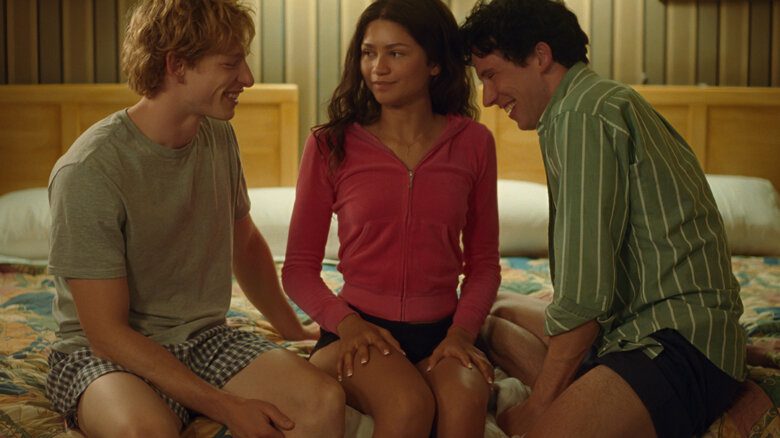This month, queer indie music darlings Tegan and Sara Quin return to their origin stories with a new memoir. High School takes readers back to the late 1990s and dives deep into the musical duo’s adolescence in Calgary. Written in alternating chapters from each twin’s point of view, the book reveals the stories behind their first loves and first songs — and the drugs, alcohol, conflict, friendships and love that fuelled them.
Here, Sara Quin discusses the joy that can be found in looking back on challenging times.
Xtra: Most people, queers especially, don’t want to revisit their high school days — too many hormones and bad decisions. Why was it important for the two of you to write a memoir about that time?
Sara Quin: We had a similar reluctance. But the difference for us is that we didn’t just go to class and wear big clothes and have really gross hair. We had our first significant same-sex relationships. We came out. We learned how to write songs and got offered a record deal before we finished Grade 12. I wouldn’t necessarily say that high school is a place I wanted to go back to. But these are our origin stories, the moments that defined who we became as public people, as artists, as women. So it was important to go back there regardless of how much I hated my hair and clothes.
Xtra: Well now you have to expand on that. Were there any specific looks that made you go, “Oh my God, I can’t believe I actually wore that?”
SQ: Having spent 18 months revisiting videos and photographs I actually think we were really brave to dress the way that we did. We stood out and were picked on because of it. The way we dressed informed how people — even adults — experienced us: we were constantly getting kicked out of restaurants. When I look back at the way we were drawing attention to ourselves with our clothing, I feel a lot of admiration. These days, as a queer woman and a public figure I’m much more self-conscious. In professional settings I’m always thinking, “Do I belong here? Do I look like I belong here? Do I look like I’m successful?” Whereas in high school I was like, “Fuck you. If you don’t like the way I look, don’t look at me.”
Xtra: Early creative endeavours can be just as awkward to revisit as looking back on high school itself. What was it like to revisit your original material?
SQ: I was surprised to have found so much inspiring, relatable and and wise material. There’s this idea that as young, queer women we hadn’t lived enough life to be interesting or intellectual, or to write music that that should be examined and enjoyed by adults. Still, there was something so joyful about listening to those early songs. They needed to be refined, but the ideas and the energy were there.
Xtra: What is it about revisiting high school that is so appealing to some queer people? I must get invites to, like, three “Queer Prom” themed parties a year.
SQ: I don’t know if it’s just queer people. How many high school movies are geared towards adults? Growing up in the ’80s and ’90s, we had tons of movies like Can’t Hardly Wait and Dazed and Confused and Breakfast Club. As a culture we’re obsessed with our adolescence because it allows us to look back and think, What if I had done things differently? If anything, I think queer people are just trying to fill the void that exists because most of our popular culture has been created by straight people, for straight people.
Xtra: The prologue to the book discusses memory and how it was great for both of you to have a twin to share memories with. Were there any chapters that Tegan wrote from her point of view that really surprised you?
SQ: Because we formed a lot of memories together, we’ve always assumed that our feelings about our experiences have been similar. But in the book you do see some discrepancies. Tegan really hammers home the idea that the early launch of our music career in Grade 12 was thrilling. She kept journals and wrote extremely goofy, confident entries about how we were going to be a successful band. But I had the opposite feeling. I was excited, but I was also terrified.
It was almost therapeutic to have Tegan read about my first run-ins with homophobia and trauma. I think she’d always assumed my early experiences were like hers. I make that assumption about her too, sometimes. But her early queer days were joyful and fun. Mine were much more tortured than that. Being able to see a written record of those differences gave us a new perspective on each other.
Xtra: What was the hardest memory for you to unravel on paper?
SQ: I had compartmentalized how depressed I was, how hopeless everything sometimes seemed. On the one hand, my mom was accepting. And it was a time where we could go to raves and see queer people all around us. The majority of my social circle understood that I was hooking up with girls. But I now realize how hyper-aware I was of my body and my sexuality, in a world that was hostile and dangerous for queer people. I remember how traumatizing it was to hear people using homophobic slurs. If I ever heard stories about queer people it was because they’d experienced violence. Or it was public figures telling gay people to stay in their bedrooms and stop shoving their “lifestyles” in everyone’s faces. I didn’t always have the privilege of being able to talk about my identity publicly.
Xtra: I think it’s important for queer and straight people alike to remember how recent that was.
SQ: And also to remember that is still that way for many people — for those living in countries where it’s illegal to be gay. Even in Canada and in the United States there are so many areas of the law that don’t protect us. Tegan and I often talk about how we exist a world where queer people are constantly being told, “It’s better now, you can get married. The bank on your street has a rainbow sticker in the window.” There have been improvements but that doesn’t that doesn’t nullify how dangerous life can be for marginalized people.
Xtra: What was it like collaborating on a book? How did it differ from your songwriting process?
SQ: It reminded us both that we used to actually write together all the time as teenagers. When we moved to opposite ends of the country, that wrenched us physically apart but also gave us space creatively. And when we came together the collaboration process was always easy and enjoyable. In a lot of ways the writing the book was like that. We gave each other space and time to get our stories and ideas down on paper and then worked on making sure we each got a chance to tell our version of the events.


 Why you can trust Xtra
Why you can trust Xtra


